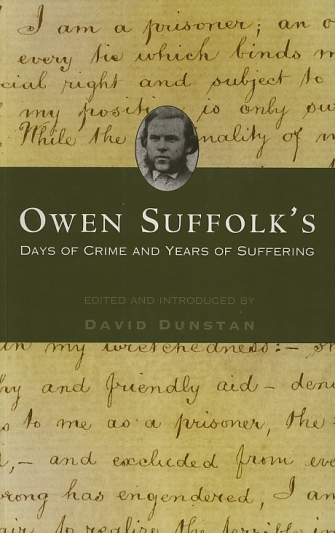Owen Suffolk was born April 4, 1829, and was not a nice, law-abiding citizen. He was born into a comfortable middle-class life in England, but everything changed when his father’s business was ruined when he was probably in his teens. To make a living he went to sea. When he returned, though, he had no money and no place to live, and instead of heading back out on another ship he started stealing. He was caught, and spent 1845 in prison (he was still only 16).
When he got out of prison he tried forgery, but once again was caught. he was in prison in 1847 when he was transported to Australia on a convict ship, the Joseph Somes. Once in Australia he tried a number of activities, including being a bushman and a “bush ranger,” which meant he probably joined a band of outlaws who robbed banks and stagecoaches. They hid out in the vast Australian bush to escape capture. And in what turned out to be a pattern for him, Suffolk was again captured.
While in prison in 1858 he started writing his autobiography, which is why we know about him and his life. He also wrote poetry and short stories. Then in 1866, he was once again transported — this time back to England! He’d been kicked out of not one but two countries because of his crimes. But this latest transport, aboard the Norfolk, came with a full pardon, so he arrived in England with a clean slate, legally speaking.
He had sent his autobiography to the Australasian newspaper before leaving, and they published it in 1867. It was pretty well written, and was popular at least in Australia (possibly elsewhere). But he probably didn’t receive any compensation for it, other than any initial payment he might have received (which he probably didn’t). Once again in England without money or residence, he turned back to crime. And he added a new one — he got married in London, then the next year, when he was in court charged with stealing a horse and carriage, he asked for mercy so he could care for his wife and infant child. The only problem was that this wife was not the same person. She was only 19 and he claimed she was actually his niece. The judge was not impressed and sentenced Suffolk to 15 years.
He was released early, and in 1880 got married again — although he may have been still married to his first wife. Nobody knows whether his second marriage, supposedly to his niece, was real (or even whether the niece really existed). The third one was on the books, though.
He took up rowing, but one day his boat, with two passengers, capsized on the Thames river. His passengers were rescued, but Suffolk drowned…or did he? Several London newspapers published a brief account of the incident, titled Melancholy Accident to an Australian Gentleman. Somebody eventually noticed the oddity of multiple newspapers publishing exactly the same account, and when they looked into it, found that Suffolk himself had written it. By the time anybody knew what happened, though, Suffolk himself had left on a ship. He was headed to America — and had stolen his latest wife’s money.
Owen Suffolk was never seen again, and never updated his autobiography, so we have to leave the story there; nobody knows what mischief he got up to in his third country. His autobiography, Days of Crime and Years of Suffering, was republished in 2000, but is now out of print. You might be able to find one somewhere though; it was edited by David Dunstan.

